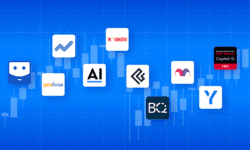The race to adopt generative AI (genAI) on an enterprise level continues to take precedence heading into 2025. Investment in genAI is projected to surpass $630 billion by 2028, driven by a nearly 30% compounded annual growth rate (CAGR). With equal intrigue and strategic caution for the booming trend, financial services firms are leaning into the many ways genAI can consolidate workflows, create competitive advantages, and enhance client experience.
Increasingly, asset managers are discovering how genAI can optimize their portfolios, enhance trading processes, source deals, and streamline due diligence, among top use cases. In addition to implementing use cases across their own firms, venture capital and private equity firms have been keen on allocating capital to genAI startups as a testament to the potential they see in these rapidly evolving firms.
Banks are also leveraging the technology to optimize their risk management processes and compliance with regulatory guidelines, automate high-volume tasks such as loan and mortgage processing, and automate client servicing and personalized support.
As financial services firms expand their footprint in the genAI space, they will look to align with solutions that adequately suit their risk tolerance and complement their strategic goals.
Investing in a Wave of Transformation
Beyond identifying and implementing use cases across their own organizations, private equity and venture capital firms are allocating significant funding to genAI investment projects. According to a recent report from Accel, generative AI startups are garnering more than 40% of all venture capital funding flowing into cloud companies. The report adds that the top six genAI companies across the U.S., Europe, and the Middle East, accounted for two-thirds or approximately $37B of funding raised by all startups since last year. This includes OpenAI, which has raised an astonishing $18.9 billion between 2023-2024.
Netting High-Value Opportunities for Asset Managers
In a recent study conducted by EY, leaders at large asset management firms identified the top three areas where genAI stood to have the greatest impact on their business:
- Data ingestion to drive alpha-generating strategies
- Investment operations and financial advice
- Middle office operations
With the ability to effortlessly ingest and synthesize large amounts of data and raw content, generative AI offers investment managers a plethora of opportunities to generate market-moving intelligence and trends with a simple query.
For example, a quick question in AlphaSense’s Generative Search yields an array of documents discussing the investments being made to support net zero goals, and surfaces the most relevant results across broker research, expert insights, industry publications, company filings, and more. These findings ultimately form the basis for investment recommendations, portfolio allocations, and placements.
GenAI platforms like AlphaSense aggregate the most compelling insights and intelligence with a fraction of the resources and time of traditional research methods, and with greater accuracy and conviction since they are trained on premium financial and business content.
Often, run-of-the-mill solutions are rooted in public, untrained data and content that run the risk of hallucinations and false results. Building and training a proprietary LLM is also a significant undertaking that is costly from a resource and investment perspective, and also requires regular ongoing maintenance to push model updates and training.
Minimizing High-Volume Core Functions
Across the banking industry, generative AI is streamlining many core functions that are typically manual in nature and high volume. According to a recent CEO study conducted by PWC, 68% respondents believe genAI will increase employee efficiency, and 63% tie the technology to an increase in revenue as well.
From a customer-facing perspective, banks are leveraging genAI to deploy the use of virtual assistants to maintain a high-touch (albeit humanless) level of service to their clients. For example, Bank of America’s virtual assistant Erica® has had more than 2 billion interactions with clients to date, helping 42 million clients since its launch. The bank estimates that more than 98% of clients obtain answers they need from Erica within 44 seconds, on average.
From an operational standpoint, generative AI is creating tremendous efficiencies across loan and mortgage processing, automating repetitive tasks and utilizing algorithms to process relevant data more seamlessly. The ability to summarize and extract key findings from complex, lengthy regulatory filings and documents allows banks to stay ahead of industry trends and developments and mitigate risk better.
Doing More with Fewer Resources
Across every sub-sector within the financial services industry, generative AI is enabling firms to do more with fewer resources by simplifying workflows, creating efficiencies, and automating repetitive and manual tasks to remain competitive and agile.
Generative AI works like a virtual analyst to surface the most relevant market perspectives and furnish on-demand answers on any topic, trend, company, or industry. By minimizing the time and effort spent on research and operational functions, teams can allocate resources to higher value, alpha-generating activities.
Discover how you can optimize and maximize your research resources with AlphaSense’s industry-leading Generative Search.
Learn how AlphaSense’s generative AI tools can streamline your research process. Start your free trial today.




